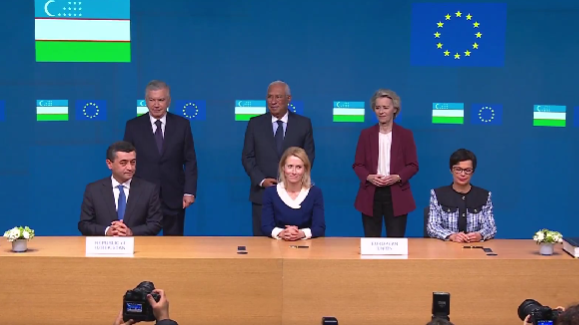The European Union and the Republic of Uzbekistan have officially signed an Enhanced Partnership and Cooperation Agreement (EPCA), representing a significant advancement in their bilateral relations. This agreement elevates regional cooperation to a new strategic level following the EU-Central Asia Summit held on 4 April in Samarkand, Uzbekistan.
“In Samarkand, we made a commitment to deepen our relations with Central Asian countries. Today we are delivering on that commitment, by reinforcing our long-standing relationship with Uzbekistan. The Enhanced Cooperation and Partnership Agreement provides a framework for Uzbekistan and the European Union to work together for the mutual benefit of our citizens. It is the moment to consolidate an already strong partnership,” emphasised Ursula von der Leyen, President of the European Commission.
Since April 2021, Uzbekistan has benefited from access to the EU market through the GSP+ arrangement, resulting in increased trade, projected to reach nearly €4.8 billion in 2024. The EPCA further supports this growth by improving market access and reinforcing sustainability commitments. The EU accounts for approximately 10.4% of Uzbekistan’s trade and is its second-largest export destination. Furthermore, Uzbekistan aspires to achieve World Trade Organisation (WTO) membership by 2026, which will necessitate bilateral agreements on tariffs and services with existing members.
This agreement establishes a robust legal framework to enhance political dialogue and deepen cooperation across a range of mutually beneficial areas, including trade and investment, sustainable development, connectivity, intellectual property, research and innovation, education, environmental protection, climate change, the rule of law, human rights, and civil society. The EPCA also fortifies collaboration in foreign and security policy, emphasising conflict prevention, crisis management, risk reduction, cybersecurity, regional stability, disarmament, non-proliferation, arms control, and export control.
Moreover, the EPCA provides opportunities for collaboration in emerging sectors, such as critical raw materials vital for facilitating green and digital transitions. This is based on the 2024 Memorandum of Understanding signed by the EU and Uzbekistan. The agreement aims to enhance regional connectivity, including through initiatives like the Global Gateway and the Trans-Caspian Transport Corridor.
Through the signing of the EPCA, both the EU and Uzbekistan reaffirm their commitment to the principles and norms of international law, as well as to promoting peace, stability, and security through effective multilateralism. Additionally, the conclusion of bilateral negotiations on market access for services and goods marks a critical milestone in Uzbekistan’s ongoing path toward WTO membership. This development illustrates the EU’s political support for Uzbekistan’s accession to the WTO and the ongoing economic reform process, alongside a commitment to a rules-based multilateral trading system centred on the WTO.
The bilateral agreement encompasses Uzbekistan’s commitments on maximum tariff rates for the import and export of goods, as well as concessions on services. These commitments will be formally documented in the forthcoming Protocol of Accession of Uzbekistan to the WTO.

